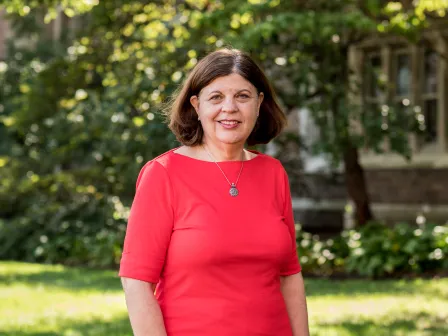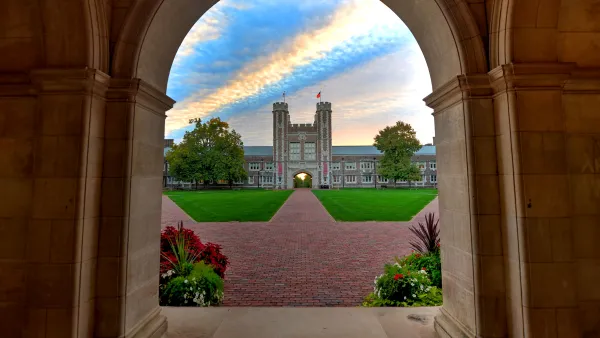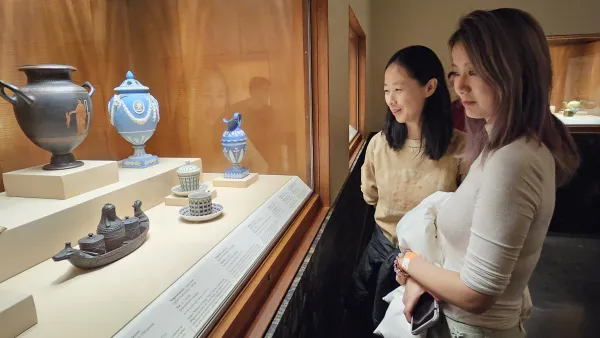Beata Grant reflects on her time at Washington University and a career teaching pre-modern Chinese women's literature and culture.

Beata Grant, professor of Chinese and religious studies, is retiring this summer after 32 years at Washington University in St. Louis. A specialist in Buddhism and pre-modern Chinese women’s literature and culture, Grant is the co-author of two books and author of four, including Zen Echoes: Classic Koans with Verse Commentaries by Three Female Zen Masters, an important volume that recovers writings by women Zen monks.
Grant was drawn to Asian literature, art, and culture at a young age. “Interestingly, I did not find these visions particularly ‘exotic,’” she said. “Rather, in many cases, they felt strangely familiar. They made sense to me. The German writer Goethe speaks of ‘elective affinities’ and the Buddhists of ‘karmic affinities,’ and perhaps that is the best way to explain it!”
In college, she studied what was then called “Oriental studies,” where her advisors tried to steer her away from literature and into what they considered to be the more practical fields of economics and politics. “They warned me that it would not be easy to find a job if I pursued my interest in pre-20th century literature and culture,” she reflects. “But I was obstinate (not to mention the fact that I had probably would have failed miserably had I studied anything outside of the humanities!), and I am glad of it.”
Over the course of her career, one of the things that Grant said she has enjoyed most has been sharing the joy of discovering oddly familiar modes of thinking in pre-modern texts. Her favorite classes to teach have often been introductory seminars, where she has “had the pleasure of sharing the curiosity, surprise and often excitement of many students who may not have been exposed to either Chinese Literature or Buddhism before. And of course, since one learns so much by teaching, these classes have allowed me the opportunity to continually deepen and expand my knowledge and understanding of these two areas of interest, both of which have engaged me for many decades now.”
Discovery is the foundation of Grant’s research, as well. In 2017, she published Zen Echoes, which reintroduced the world to the work of seven women Zen masters. “Their work lay largely hidden amidst the huge numbers of extant texts by male masters,” Grant said. “I tried to reconstruct their lives and translate some of their poems and sermons. I am now working on a larger anthology of poems not only by these woman Chan masters, but also by many other Buddhists nuns and laywomen whose writings I have been excavating and rediscovering over the years.”
Grant’s colleagues speak of her groundbreaking scholarship, her mentorship of students and younger faculty, and her generosity and kindness as a colleague. She will be greatly missed by all in the Department of East Asian Languages and Cultures and the Program in Religious Studies at WashU.

Reflections from Grant’s colleagues and former students:
Marvin Marcus, Chair of East Asian Languages and Cultures:
“Reflecting on the legacy of someone just at the point of retirement is an interesting challenge, insofar as this can only be fairly judged based on more distant retrospection. But there are those individuals whom we recognize as having the right stuff of legacy. This is very much the case with my colleague and friend, Beata Grant. Beata’s scholarly attainments and her place in the field of Chinese literary and religious studies are well known and duly acknowledged, and she has earned the respect and admiration of students and colleagues alike. Beata’s long and distinguished career here at the university, and the students she has trained over the years who have gone on to establish themselves in the field — herein lie the seeds of her legacy, to be sure.
But there is more to the story. For me, Beata Grant counts far more than the sum of an impressive CV. Beata is endowed with a beautiful and gracious spirit, which expresses itself in unusual — and unusually moving — ways. I’m thinking in particular of her artwork. Channeling an abiding interest in, and embrace of, the Buddhist faith and its ideals and values, Beata has fashioned a number of mandala-like images that I find myself deeply drawn to. And her landscapes, which suggest the vistas of her New Mexico roots. These are equally stunning. The qualities that have gone into the making of a career centering on the legacy of women of faith — and her own creations that embody faith, a concern for others, and a fundamental goodness and decency — this, to my mind, is what makes Beata Grant so special, so indispensable, I’m inclined to say. Beata’s presence among us will be sorely missed. But her spirit, and the works that derive from it, will most assuredly live on."
Laurie Maffly-Kipp, Archer Alexander Distinguished Professor and Interim Dean of the Graduate School:
"Professor Grant has been an integral part of the program in Religious Studies for many years. She served as its director, and has continued to anchor our offerings in East Asian religions. We will miss her contributions and the talents she brought to her teaching and research."
Bob Hegel, Liselotte Dieckmann Professor Emeritus of Comparative Literature:
“Throughout her years at Washington University, Beata has been the model colleague: a reliable source of thoughtful advice for me and other faculty members, a model in finding ever new ways to excite student interest and to support their research, and a highly productive scholar as well. In addition to her insightful literary analyses, her translations of poems by Buddhist nuns and other laywomen of China have reached far beyond the academic community to contemporary followers of Buddhism throughout the English-speaking world. No “ivory tower” intellectual who communicates only with other specialists, Beata Grant has demonstrated deep personal engagement with her students, her colleagues, and the much larger community that we all aspire to achieve. Through her wisdom and knowledge, and through her characteristic devotion to learning and understanding, Beata has exemplified the best of what humanistic education can offer.
I had long known that Beata was a wonderful landscape photographer, but it was a delight over the last few years to watch her develop her other artistic skills as well: painting and the making of mandalas by using the computer as a tool.”
Rebecca Copeland, Professor of Japanese Language and Literature:
"Not only has Beata Grant been a successful and award-winning instructor, but her lovely and accessible translations and careful scholarship have also opened new pathways to the understanding of the lives and poetry of Chinese women, particularly of Buddhist nuns. Hers is a legacy to be celebrated."
Yunjing Xu, former graduate student of Beata Grant and Assistant Professor of East Asian Studies at Bucknell University:
"Professor Grant is a great mentor to me and to other students. Not only did she open my eyes to the remarkable lives and incredible works of Chinese women in the past, but she herself also practices daily the strength, confidence, empathy, and compassion of these historical women. As a new college teacher only five years into my career, I often revisit my interactions with Prof. Grant for inspiration. She taught me how to teach my courses and how to take care of my students. Thank you for being my mentor. I cherish every moment of our time together, and wish you a great retirement life ahead!"


